Bullying of any kind is never ok. The use of digital technology to deliberately hurt someone can leave a lasting impact. It is important to remember that you are not alone. If you are being cyber bullied there are people you can talk to and things you can do to protect yourself.
Cyber bullying can constitute as a crime under South Australian or other State or Federal law when it involves:
- Using the Internet or a phone in an offensive, threatening or harassing way;
- Threats;
- Stalking (including messaging or texting someone to harm or scare them);
- Accessing another person’s internet account(s) without permission;
- Defamation (that is, spreading lies to intentionally damage someone’s reputation); or
- Encouraging self-harm or suicide.
Offensive Messaging:
A message or post on a phone or the Internet can be considered ‘offensive’ under the law if it is likely to cause serious anger, outrage, humiliation or disgust. A judge may rule a maximum penalty of 3 years in jail.
Remember these stories in the news?
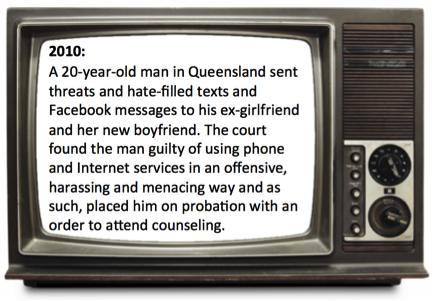
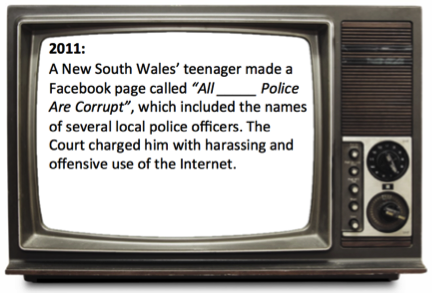
Threats:
It can also be a crime to intentionally frighten or threaten to harm someone. This can be done either through a phone, text message, email or online post. A threat to kill someone carries a maximum penalty of 10 years in jail. Similarly, it is a crime in South Australia to make (or encourage others to make) threats of physical harm to a person because of their race.
Remember these stories in the news?
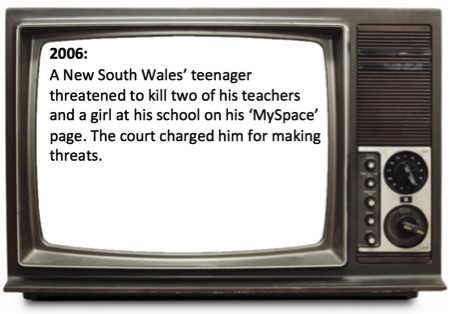
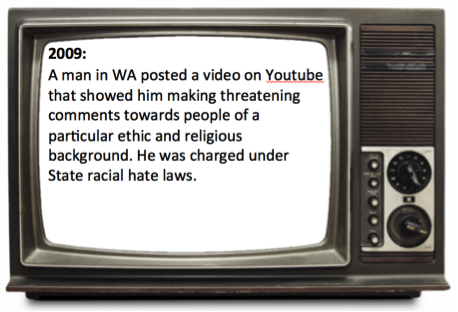
Stalking:
Stalking occurs when someone receives repeated attention from another that intimidates or frightens him or her. Stalking can include: making unwanted phone calls, emails, text messages and messages on social media. Stalking constitutes a crime in South Australia, if a person calls, messages or otherwise bothers somebody twice or more with the intent to harm, harass or scare. Without a weapon, the maximum penalty is 3 years in jail.
Remember these stories in the news?
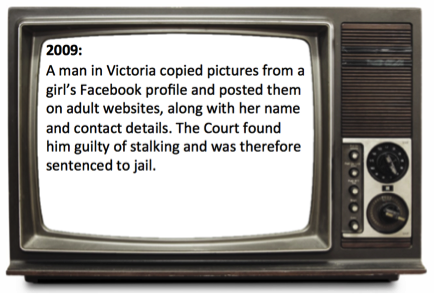
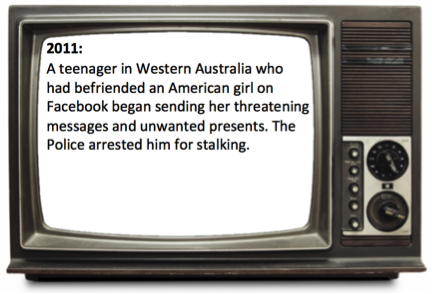
Unauthorised Access:
It is a crime under both State and national law to log into another person’s online account without their permission. The maximum penalty for this crime is 2 years in jail.
Defamation:
It is also a crime in South Australia to publish untruthful information about another in order to cause them serious harm. The maximum penalty for such an offence is 3 years in jail.
Remember this story in the news?
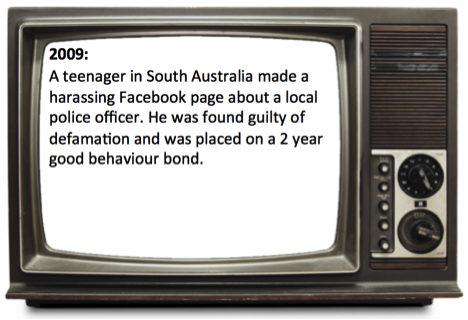
Encouraging Self-Harm or Suicide:
It is a crime under both South Australian and other State and Federal laws to cyber bully someone in a way that intentionally encourages or causes them to kill themselves. The maximum penalty for such an offence is 14 years imprisonment where suicide was committed. In addition to the Courts, a cyber bully can also get in trouble with their Internet or telephone provider, website administrator, schools and non-criminal courts.
Most website domains have ways of monitoring what is being posted. Users can manually flag and report any harassing content to the website administrator. Websites can remove content on an account that is found to be inappropriate and breaches the website’s Terms and Conditions. They may even delete a user’s account if they discover cyber bullying. Phone providers can suspend or cancel a person’s phone number and contract if it is found that a person has repeatedly harassed others through calling or texting. In the most serious of cases, the website or phone providers may report illegal behaviour to the police.
Discipline for Cyber Bullying at School:
All South Australian schools are required to have anti-bullying plans in place to deal with all forms of bullying, including cyber bullying. Schools are responsible for ensuring students know what their anti-bullying plan is and teachers are responsible for making sure that the plan is followed. Whilst schools may deal with cyber bullying differently, it should always be taken seriously. Students found to be bullying other students or teachers can be suspended or expelled. Depending on the seriousness of the bullying, a school may also call the police if a crime is to be believed to have been committed.
Discrimination Complaints and Other Legal Actions:
When cyber bullying involves unwanted sexual advances, sexual threats or discriminatory comments from a person at work or school, a complaint can be made to the South Australian Equal Opportunity Commission or the Australian Human Rights Commission. A comment is declared ‘discriminatory’ if it makes fun of someone because of their race, sexuality, gender identity or disability.
If cyber bullying involves making a comment or posting images that damages someone’s reputation then cyber bullies can be sued by the victim for defamation or other similar claims.
What can happen if Cyber Bullying is happening to you?
If you ever feel like you need to talk to someone about anything that is bothering you and you live in Australia, then contact ‘Kids Helpline’.
You can also take the following personal steps against cyber bullying:
- Keep Calm: If you are having issues with your friends or another person, whether it be at school, elsewhere or online, try not to react via email, text or social networking websites. It can be tempting to respond to something harmful when you feel angry or upset, but anything written down is permanently recorded and is never ‘private’.
- Talk to Someone: If someone bullies you that result in you feeling upset, scared or uncomfortable, it is best to talk to a friend, parent or other trusted adult. You should never feel like you have to deal with your hurt feels or embarrassment alone. The sooner you do talk to someone, the sooner that something can be done about the problem and to help you feel safe.
- Ask the Person to Delete It: If a person has posted something offensive about you, often the easiest thing to do is simply to ask them to delete it. You can tell them that their actions could be a crime. If a person refuses to delete their post then you can forward that post to a lawyer. From there, a lawyer can write a notice explaining to the person the laws and inform them that you consider going to the police if they do not remove the post.
- Record Evidence: Take screenshots or print off any bullying messages or posts. Similarly, record the times and dates of any harassing phone calls.
- Report to the Website: You can report cyber bullying or harassing content to a website administrator if you wish for the content to be removed if it violates the website’s Terms of Use. If you need further help, consider ACMA’s guide to social media.
- Report to your Phone Company: If you are receiving upsetting calls or texts, you can make a formal complaint to the phone company. The company may be able to trace the caller or sender and send them a warning letter. If the bad behaviour does not go away after repeated warning letters, the offender’s phone number may be suspended or cancelled.
- Block the Bully: Most websites allow you to block ‘problem users’ from contacting you. There are also applications available for some phones that let you block calls and texts from certain people; contact your phone company for more information.
- Talk to a Teacher, School Counsellor or Principal: Most schools have anti-bullying guidelines that cover cyber bullying. If the person who is bullying you is a student of your school, then contact the school to see if they can handle the problem for you.
- Apply for a Protection Order: If someone is using your personal information to stalk, intimidate, harass or threaten you, you may be able to apply to the Court for an intervention order to keep a person from re-contacting you.
- Contact a Free Legal Service in your area about Legal Action: You may also have a claim to sue someone who harms your or your reputation by posting or sharing offensive material about you.
- Report it to the Police: If you believe you are the victim to one of the crimes explained in this article, you can report the offender’s behaviour to the police. If your situation involves nude or sexual images of a young person, it is best to gain some free legal advice before advising the police. If someone is threatening or scaring you, please contact the police immediately.
This article describes the law in relation to cyber bullying in South Australia. The law may differ if you are in a different State or Territory of Australia.

